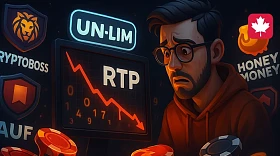
Northern Ireland's New Gambling Laws: A Step Backward for Consumer Protection
Northern Ireland has recently made significant changes to its gambling laws, aligning them with Great Britain’s more relaxed regulations. The Legislative Assembly has approved reforms that increase the stakes and prize limits on gaming machines. While the government defends these changes as a modernization effort, critics warn that the lack of adequate consumer protections could have serious negative consequences, including a rise in illegal gambling activities.
A Shift Toward Looser Regulations
For years, Northern Ireland’s gambling laws have been stricter than those in Great Britain, particularly regarding gaming machines, which were subject to lower stakes and prize limits. However, with these new reforms, gaming machines will now be regulated in the same way as in Great Britain. The maximum stake for Fixed-Odds Betting Terminals (FOBTs) will increase to £2, and the maximum prize will be capped at £500. These changes are seen by some as necessary to bring Northern Ireland in line with its neighbors, but they come with significant risks.
One of the most concerning aspects of these reforms is the absence of key safeguards to protect vulnerable individuals. While the government has introduced measures such as criminalizing the use of high-stakes machines by minors and penalties for cheating, they have failed to implement provisions found in Great Britain, like the Gambling Levy. This levy funds vital addiction support and prevention programs, but since Northern Ireland will not benefit from it, the increased stakes may worsen the already high gambling addiction rates in the region.
Gambling Addiction Concerns on the Rise
Critics, including North Antrim MLA Timothy Gaston, argue that the new regulations will exacerbate the region's existing gambling problems. Northern Ireland already experiences gambling addiction rates five times higher than England, and without the protections afforded by the Gambling Levy, there is concern that more people will fall into addiction. Gaston expressed fears that the deregulation of the gambling industry would lead to even more harm without providing adequate funding for addiction treatment and prevention.
Gambling experts also point to research that links high-stakes gaming machines to a higher risk of problem gambling. Studies have shown that machine-exclusive gamblers face significantly higher rates of addiction, and the recent regulatory changes could expose even more people to these risks.
The Shift Toward Illegal Casinos
The increasing accessibility of high-stakes gambling in Northern Ireland, without the necessary consumer protections, may drive more players toward illegal online casinos. As restrictions tighten within regulated platforms, players often turn to unlicensed operators to satisfy their gambling needs, where safeguards are virtually nonexistent. This shift not only undermines the regulatory efforts but also places consumers at risk of fraud and exploitation.
With these regulatory changes, Northern Ireland is at a crossroads. While the government argues that aligning with Great Britain’s framework brings clarity and improved oversight, the lack of comprehensive consumer protections could lead to harmful consequences. As more players look for higher stakes and better prizes, it’s clear that Northern Ireland’s crackdown on illegal gambling may fall short, and the region could see an increase in illegal gambling activities, further hurting its residents.
Conclusion: Striking a Balance Between Regulation and Protection
While Northern Ireland’s gambling reforms might have been intended to modernize the industry, the absence of sufficient safeguards, especially in comparison to Great Britain, raises serious concerns. The decision to remove stricter regulations without providing adequate addiction support or funding mechanisms could lead to a surge in gambling-related harm and force more people into the arms of illegal operators. In the pursuit of modernization, Northern Ireland risks sacrificing the well-being of its residents. Excessive restrictions can be just as harmful as inadequate regulation, and striking the right balance is essential to ensuring a safe and responsible gambling environment.





tickscollar All this bullshit was invented to squeeze out the last money. It used to be easier - bet on red, win or lose. And now some chickens are running, airplanes are flying... Circus.


xSuiZ The article is fire! Everything was laid out according to the facts. Drake is not a ludomaniac, he is a walking advertisement. And while the suckers believe in his "curse", Stake rakes in the money. Beautiful, you can't say anything. I've been riding a steak myself for a year now, I threw in crypto and generally don't give a about all the blocking.


Leoak Finally a good article on NC! I've been playing them since the very beginning, since the first Deadwood. Yes, their dispersion is crazy, you can lose a deposit in 100 spins. But when he pours ... It's worth it. In Mental x15k I caught, I still remember this spin. The whole point is in their x-mechanics, they really change the game, and not just for show.



tealblossom 2 minutes to respond? Yes, this is a dream! Otherwise, while you wait for these operators, you will already want to play. It's high time!











































I’ve seen firsthand how gambling addiction can destroy lives. This reform might be an attempt to modernize, but it’s definitely opening the door for even more harm. Without safeguards like the Gambling Levy and proper addiction treatment, we’re just making things worse for those already struggling.
It’s shocking to me that they’d increase gambling stakes without implementing proper addiction services. The Gambling Levy in Great Britain is a step in the right direction, but Northern Ireland won’t benefit from it. The government seems to be ignoring the consequences of these changes, and I fear it will only make the problem worse.
This is outrageous. How can they align the gambling laws with Great Britain’s when Northern Ireland doesn’t even have the same protections in place? We should be focusing on preventing addiction, not making it easier for people to lose their money. It’s just a matter of time before people start flocking to illegal casinos, where there’s no regulation or support.
I really don’t understand how the government can make these changes without proper safeguards in place. Northern Ireland already has one of the highest gambling addiction rates, and now we’re increasing the risks with higher stakes. Where’s the plan to protect vulnerable players? It feels like the government is prioritizing revenue over public health.